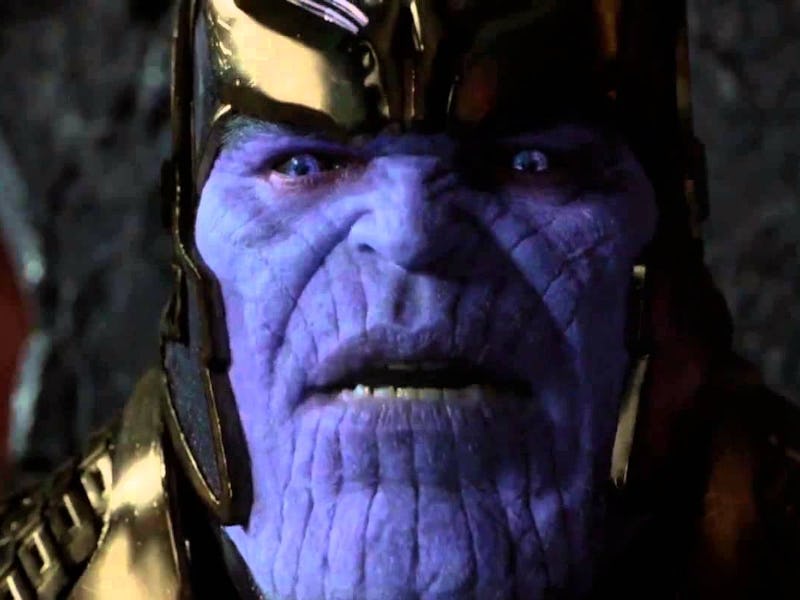Marvel's Avengers 'Infinity War' Sounds Like a Disaster, 67 Characters and All
Here's the thing with epic, universe-spanning superhero crossovers: they're rarely good, and sometimes they're awful.

The Avengers has been planning for Infinity War from the beginning, when its first film’s post-credits sequence introduced the villain Thanos. It’s been built up directly in Guardians of the Galaxy and Avengers 2, and indirectly every time an Infinity Stone has been implied on-screen. The other Stage 3 films, like Civil War and Thor: Ragnarok indicate that the Marvel Cinematic Universe is heading toward an ending.
The directors, the Russo brothers (taking over for Joss Whedon) have announced that they have sixty-goddamn-seven characters they’re considering including. And it’s going to be an adaptation of some of Marvel’s biggest events of the 1990s, most notably The Infinity Gauntlet. Infinite War is going to be huge. So huge it’s been given two films.
Infinity War is everything The Avengers has been working toward, and it’s everything fans could ever dream of.
It sounds awful.
Marvel's Phase 3 timeline
The greatest strength of the MCU is that it’s a shared universe, where events tie together, other characters can drop into movies, and a history exists to help set up stories without needing to make something new. The greatest weakness of the shared universe, on the other hand, is bloat.
Read enough superhero comics and you’ll run into crossover events. Civil War, Secret Wars, Infinity Gauntlet, and so on. They’re huge and they dominate sales, but, dirty little secret: crossovers aren’t good.
Usually a giant crossover settles for “competent.” They get the sales, they set up new characters and series, they kill off a major player or two for headlines, and everyone goes home mildly dissatisfied. Sometimes it’s significantly worse than that, though, as with crossovers like the pointless Fear, Itself or the misguided Avengers Vs. X-Men. (And these are just Marvel. DC’s crossovers often attempt to fix their entire universe. The bigger margin for error means more likely disasters.)
The most famous scene from DC's biggest crossover, 'Crisis on Infinite Earths'
There are two core problems with massive crossovers. First, because they’re so huge and have to cater to so many people, there’s almost no room for good character work, which is the center of any story. It’s all action and dramatic monologue-ing, all the time.
Second, crossover events have to incorporate all the corporate motives needed for them. Fear, Itself is “The Crossover Where Steve Rogers Becomes Captain America Again.” Secret Invasion turned into an advertisement for Dark Reign and a method for resurrecting Mockingbird. And Infinitely Gauntlet was little more than an excuse for literally every hero and villain to fight the same bad guy at once. The Marvel Cinematic Universe isn’t immune to this; by Avengers 2, corporate demands for advertising future films threatened what few character moments existed in the film.
Spider-Herc, from 'Spider-Island' -- basically the only time Marvel used a crossover for fun...ever.
There are a few ways that crossovers can transcend these issues. Annihilation was given a blank slate, with the nearly-fallow Marvel Cosmic able to be knocked down and rebuilt, with the best parts of it kept around and moving forward. Spider-Island was so slight it could just have some character fun. Messiah Complex used its complexity to tell a long-term serialized story. And Infinity had a single creator, Jonathan Hickman, maintaining control of the project and storytelling style.
None of these are available to Marvel for Infinity War. The MCU has one of the most popular brands on the planet, so it can’t wipe the slate clean. It can’t go small-scale and silly with its Avengers, although Ant-Man was a promising move in that direction for at least some of its films. Film simply can’t go full serialized in the way that a weekly TV series or monthly comic can. And the idea of a single figure controlling a story this big for the MCU is utterly laughable, especially after Whedon’s departure.
'Ultimatum.' It's uglier on the inside, astonishingly.
Instead, there’s a clear worst-case example that seems distressingly plausible: Ultimatum. In the early 2000s, Marvel comics struck gold with a brand new, cinematic-style “Ultimate” universe. By wiping continuity, focusing on the most famous characters, integrating each books’ stories with one another, and making their books shiny, the Ultimate universe prefaced the MCU. But eight years in — a similar amount of time as the MCU has existed now — its continuity was getting complicated and its character list was getting bloated. Hence Ultimatum, which was supposed to be both an end to the old and a new beginning to the universe, and instead became one of the most-loathed comics in the history of the medium.
Disney probably won’t let Infinity War plumb the depths of Ultimatum, with its orgy of deaths peaking at the cannibalistic mutilation of a beloved character’s corpse. But the hubris of believing that going bigger, more dramatic, more characters, more crossover power? That’s the fatal flaw of Ultimatum and of every failed crossover. And Infinity War seems like the prideful Marvel Cinematic Universe speeding with no brakes toward exactly that kind of fall.